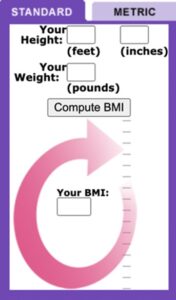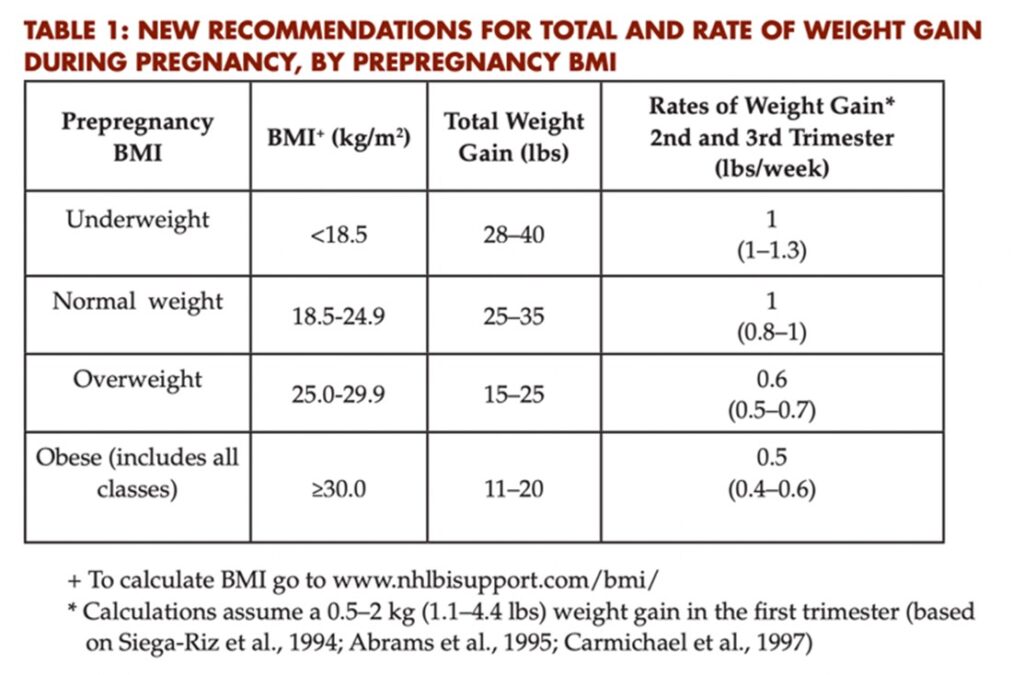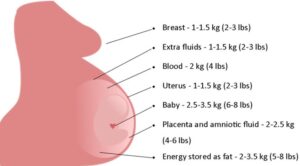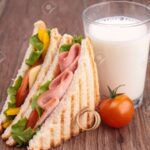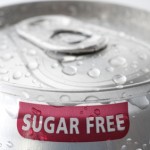How Can You Enjoy Eating Without Getting Fat?
Author: Dr. Stephen Chaney
 You are probably tired of hearing about how bad processed foods are for you. If you have been following the headlines, you probably already know that diets high in processed foods are linked to obesity, type 2 diabetes, heart disease, some forms of cancer, memory loss, liver disease, kidney disease, depression, risk of dying from any cause, and much more.
You are probably tired of hearing about how bad processed foods are for you. If you have been following the headlines, you probably already know that diets high in processed foods are linked to obesity, type 2 diabetes, heart disease, some forms of cancer, memory loss, liver disease, kidney disease, depression, risk of dying from any cause, and much more.
And this is a serious problem because 60-70% of the American diet comes from processed foods.
In fact, you may have seen these headlines so frequently that your eyes glaze over, and your mind shuts down any time you see the words “processed foods” in the title.
This week I will be sharing the latest studies on why processed foods make us fat. Stick with me on this. This is not just another article on processed foods. While the focus of the article is on processed foods, the studies it covers are valuable because they also identify some unprocessed foods that can make us fat.
Spoiler alert! Today’s “Health Tip” is important because it teaches us that weight control is not as simple as eliminating processed foods from our diet. We also need to know which unprocessed or minimally processed foods to eat less of.
Before I proceed, I should give you a brief review of how processed foods are defined because that definition has changed in recent years.
What Are Processed Foods?
 Everyone used to have a good understanding of which foods were processed. But several years ago, the scientific community introduced a new food classification system called “The NOVA food classification system” and introduced a new category – ultra-processed foods. I have covered this classification system in previous “Health Tips From the Professor” articles, but I will review it here.
Everyone used to have a good understanding of which foods were processed. But several years ago, the scientific community introduced a new food classification system called “The NOVA food classification system” and introduced a new category – ultra-processed foods. I have covered this classification system in previous “Health Tips From the Professor” articles, but I will review it here.
The NOVA system categorizes foods into four groups according to the extent of processing they have undergone:
- Unprocessed foods.
-
- This category includes foods like fruit, vegetables, milk, eggs, and meat.
2) Processed culinary ingredients.
-
- This category includes foods you might find in restaurants or prepare yourself to which things like salt, sugar, vegetable oils, butter, or cream were added in the preparation.
3) Minimally processed foods.
-
- This category includes foods like canned vegetables, freshly made breads, and cheeses.
4) Ultra-processed foods.
-
- This category includes foods like soft drinks, chips, packaged snacks, most breakfast cereals, chicken nuggets & fish sticks, fast food burgers, hot dogs, and other processed meats.
The actual list is much longer, but you get the idea. What we call processed foods, scientists now call ultra-processed foods. The article I am discussing used the term “ultra-processed foods” in the title.
But, since the term “ultra-processed foods” has not yet entered the popular vocabulary, I will use the term “processed foods” in this article because it is more understandable to the average reader.
Does Processed Food Make You Fat?
 I shared a study in a previous issue of “Health Tips From the Professor” that suggested that the answer was yes, but did not answer the question of why. That’s because of the way the experiment was designed.
I shared a study in a previous issue of “Health Tips From the Professor” that suggested that the answer was yes, but did not answer the question of why. That’s because of the way the experiment was designed.
The ultra-processed diet and unprocessed diets were matched with respect to:
- Total calories in the food portions given to the subjects.
- Caloric density (calories per serving size). That’s because caloric density has been linked to overeating (I’ll discuss that in more detail below.) The authors of the study eliminated that variable.
- Macronutrients (carbohydrate, fat, & protein). I’m sure you’ve seen blogs suggesting that carbohydrates or fat cause weight gain. And you’ve probably seen blogs suggesting that high protein diets cause weight loss. The authors eliminated these variables.
- Total sugar, fiber, and sodium. That’s because the sugar, fat, and sodium content of foods increase their tastiness (palatability), which has been linked to overeating (more below). The authors eliminated this variable.
In short, this study compared a tasty, healthy ultra-processed food diet with a tasty, healthy unprocessed food diet. [Note: This does not represent the real world. In the real world the ultra-processed foods eaten by most Americans are higher in caloric density, sugar, fat, and sodium and lower in fiber than unprocessed foods.]
However, in the scientific world, this was an excellent study design. By eliminating variables thought to explain the correlation between ultra-processed food consumption and obesity, the study was able to focus on two questions:
#1: With those variables eliminated, do ultra-processed foods still lead to overeating? Here the answer was a clear, yes.
- The study participants eating ultra-processed foods ate 500 more calories per day than those eating unprocessed foods. (Both groups were presented with meals and snacks containing the same number of calories and told to eat as much as they wanted.)
- Participants eating ultra-processed foods gained 2 pounds in just two weeks, while those eating unprocessed foods lost 2 pounds.
#2: If so, what else about ultra-processed foods leads to overeating? One popular theory of why ultra-processed foods lead to overeating is that they cause large blood sugar spikes and crashes, which stimulates appetite. But the authors of the study were disappointed to find no large blood sugar spikes following consumption of ultra-processed food meals.
However, I don’t think their data disproves the blood sugar spike theory. Remember that this was a “healthy ultra-processed food diet”. The amount of sugar and fiber was identical in the ultra-processed and unprocessed food diets. More importantly, when I looked at the sample menus provided by authors as supplementary information, each meal contained a significant percent of whole, low-glycemic foods. This was a “healthy ultra-processed food” diet designed by a dietitian, not what the typical American eats.
So, why did the ultra-processed food group eat more in this study? This study did not provide an answer to that question, but other studies (described below) have provided probable answers to that question.
Why Does Processed Food Make You Fat?
What do other studies tell us about why processed foods make us overeat and gain weight? Here are the top 7 mechanisms that have been suggested and what they mean for us.
 #1: Caloric Density: Simply put, caloric density is the number of calories in a serving of food. When you consume foods with a high caloric density, you are more likely to consume excess calories without even thinking about it.
#1: Caloric Density: Simply put, caloric density is the number of calories in a serving of food. When you consume foods with a high caloric density, you are more likely to consume excess calories without even thinking about it.
When I was still teaching medical students, I used this example to illustrate the effect of caloric density on calories consumed. “There are the same number of calories in a 2-ounce candy bar and a pound of apples. You can eat a 2-ounce candy bar and be ready to eat more. If you eat a pound of apples, you are done for a while”.
Since most processed foods have a higher caloric density than unprocessed foods, the simplest solution to weight control is to limit processed foods in your diet.
However, how you or your favorite restaurant prepares unprocessed foods is important as well. For example, the addition of cheese or cream sauces can significantly increase the caloric density of the food. This is why the NOVA food classification system I described above created a new category of “culinary foods” to describe these kinds of foods.
#2: Hyper-palatability: In prehistoric times foods that were sweet, salty, and fatty were essential for survival, so we are hardwired to desire those foods. Here is why:
- We need a certain amount of sugar for our brain, red blood cells, and a few other tissues to function. Wild game provides almost no carbohydrate. Fruits were the best source of sugar, but fruits were scarce prior to farming. The craving for sweetness drove us to forage far and wide to find fruits and other plant sources of sugar and carbohydrate.
- Sodium is essential for survival, but unprocessed plant and animal foods provide very little. That’s why even in Biblical times, salt was worth its weight in gold.
- In prehistoric times, food was sometimes scarce, especially in winter. It might be a week or more between meals. Fat stores got prehistoric man through these times of scarcity, so it was important to eat fatty meals in times of plenty. [Note: We no longer live in times of scarcity, and those fat stores have gone from being an asset to being a health concern.]
Unfortunately, “Big Food, Inc” has weaponized these hardwired desires for sweet, salty, and fatty foods. Simply put, processed foods taste good because they fulfil our hardwired taste desires. Scientists call it “hyper-palatability”. But whatever you call it, we want to eat more, and that leads to overeating.
And again, the way we prepare the foods we eat also matters. It’s only natural to add extra salt, sugar, and/or fat to the foods we prepare so they taste better. And if we add too much, we make the healthy foods we eat hyper-palatable, and we are tempted to overeat.
On a personal note, I never knew you might want to add sugar and fat to the vegetables you cook before my family moved to the south. On the other hand, I had never eaten collard greens before either.
#3: Food Consistency: When you look at studies on the effect of food consistency on calories consumed, you find that there are several different ways of defining food consistency, but they are all looking at the same thing from a different perspective – like the fable of the 6 blind men trying to describe an elephant.

- Food Structure: The classic study, published in 2009, compared the effect of sliced apples, applesauce, and apple juice eaten shortly before a meal on the number of calories consumed at the meal. In terms of calories consumed during the meal, the results were clear. It was apple juice > applesauce > apple slices.
This drew attention to the effect of food structure on calories consumed. Apples are a whole food with cellular structure intact. Applesauce contains all the nutrients, phytonutrients, and fiber of whole apples, but the cellular structure has been lost. Apple juice contains most of the nutrients and phytonutrients of applesauce, but the fiber has been lost.
Why does the structure of whole foods matter?
-
- Cell structure must be destroyed before digestion can occur, the release of sugar and carbohydrates from the food is delayed. This reduces the spikes and valleys of blood sugar that can increase appetite.
-
- Transit time of the food through the intestine is also delayed. Thus, the feeling of fulness persists longer, which reduces appetite.
There are two takeaway lessons from this study that may not be so obvious:
-
- Neither applesauce nor apple juice meet the NOVA definition of an ultra-processed food. So, simply removing processed foods from your diet may not be enough to reduce your appetite and, therefore, your caloric intake.
-
- In addition, adding fiber back to apple juice did not make it equivalent to applesauce in reducing appetite. So, despite what Big Food Inc tells you, adding fiber to processed foods does not turn them into health foods.
- Soft Versus Hard Foods: Many processed foods are soft, and most unprocessed foods are hard. So, you
 could think of this as a description that separates processed foods from unprocessed foods.
could think of this as a description that separates processed foods from unprocessed foods.
But, if you consider the apples versus applesauce comparison I described above, it is obvious that soft versus hard description also pertains to minimally processed foods such as applesauce and whole, unprocessed foods such as apples.
For example, one recent study comparing soft versus hard foods found it didn’t matter whether the soft foods were processed or unprocessed. People in the study ate more calories from all soft foods than from hard, unprocessed foods such as raw fruits and vegetables.
- Fast Versus Slow Foods: This description separates foods based on the speed at which they are digested and pass through the intestine. Once again, you might think of this as a description that separates processed and unprocessed foods until you think about applesauce versus apples comparison.
And, as you might expect, a recent study comparing “fast” versus “slow” foods found it didn’t matter whether the fast and slow foods were processed or unprocessed. People in the study ate more calories from fast foods than from slow foods.
[Note: This study defined “slow” foods as harder, chunkier, more solid, and more viscous. While the first three adjectives describe what other scientists also refer to as “hard” foods, the final adjective broadens the category to include “soft” foods like oatmeal.]
How Can You Enjoy Eating Without Getting Fat?
For most Americans, weight is a constant uphill battle. Their weight increases by a few pounds every year, and over time that continuing weight gain adds up. Diets are never enjoyable, which is part of the reason they almost always fail in the long term. You want to control your weight, but you also want to enjoy what you eat. Why is that so hard?
The secret to a healthy weight is to find foods you enjoy that don’t increase your appetite – foods that fill you up, so you eat less naturally. Here are my 4 tips for eating foods you enjoy without getting fat.
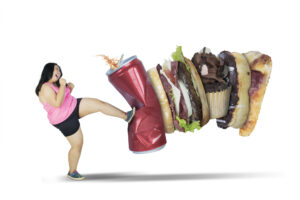 Tip #1: Limit processed foods. Processed foods tend to have a high caloric density; are hyper-palatable, soft, and fast; and lack the intact cellular structure of whole, unprocessed foods. And multiple studies, such as the one I cited above, agree that processed foods cause us to eat more and to gain weight. So, the single most important step you can take to control your weight is to limit your intake of processed foods.
Tip #1: Limit processed foods. Processed foods tend to have a high caloric density; are hyper-palatable, soft, and fast; and lack the intact cellular structure of whole, unprocessed foods. And multiple studies, such as the one I cited above, agree that processed foods cause us to eat more and to gain weight. So, the single most important step you can take to control your weight is to limit your intake of processed foods.
Tip #2: Choose minimally processed foods wisely. The studies I shared above suggest that avoiding processed foods may not be enough. We also need to look at the minimally processed foods we eat (applesauce, for example). These studies suggest we should also favor whole, unprocessed foods over minimally processed foods that are softer and faster (more quickly digested).
By now, you might be saying, “Wait a minute. I thought you said I could enjoy eating without getting fat. How can I enjoy eating if I have to give up my favorite processed and minimally processed foods?”
My short answer would be, “No. But you might want to broaden your horizons”. We all tend to be creatures of habit. We eat a relatively small variety of foods on a regular basis. When my wife and I decided to eat healthier, we kept trying new foods until we found new, healthier foods we loved.
The category of whole unprocessed foods offers many options. There are fruits, vegetables, many varieties of 100% whole grains, beans, nus, seeds, eggs, and meats. And we are blessed to live in a country with abundant choices. When you walk into your local supermarket you will find dozens of foods in each of these categories that you have never tried before. Be daring. Keep trying new foods until you find new favorite foods you love.
Tip #3: Be aware of how foods are prepared. The studies described above also suggest how we prepare the food is important. We can start out with a whole unprocessed food and end up with something no better than processed food if we prepare it incorrectly. If we add lots of cream, cheese, butter, and/or sugar, we increase the caloric density. And this can lead to us consuming more calories without even thinking about it. Throw in some salt and we have also made the food hyper-palatable, which makes us want to eat more.
Throw in some salt and we have also made the food hyper-palatable, which makes us want to eat more.
Now you might be saying, “But I grew up with my food being cooked this way. This is my comfort zone. Do I have to completely change the way I cook my food, and the items I choose at my favorite restaurant?”
Again, my short answer would be, “No, but you might want to try new recipes.” I am not a cooking guru. That would be my wife. But I do know there are lots of books and web sites featuring healthy recipes. Once again, be bold. Try new recipes until you find new favorites. Try new items on your favorite restaurant’s menu or try new restaurants until you find healthier, restaurant foods you love.
Tip #4: Never say never. This is perhaps the most important tip. Whenever we tell ourselves we can never eat a food again, it becomes irresistible. We are setting ourselves up for failure. The goal should be to change unhealthy foods and unhealthy recipes from an everyday occurrence to an occasional pleasure.
The Bottom Line
Multiple studies show that eating processed foods leads to weight gain. It may be no coincidence that 60-70% of the foods Americans eat is highly processed and 60-70% of us are overweight or obese.
In the article above, I summarize recent studies asking why processed foods make us fat. If you think these studies are only of interest to scientists, you would be wrong. These studies also help us to identify unprocessed and minimally processed foods in our diet that can make us fat.
For more information on these studies, and 4 tips on how you can enjoy eating without getting fat, read the article above.
These statements have not been evaluated by the Food and Drug Administration. This information is not intended to diagnose, treat, cure or prevent any disease.
_____________________________________________________________________________
My posts and “Health Tips From the Professor” articles carefully avoid claims about any brand of supplement or manufacturer of supplements. However, I am often asked by representatives of supplement companies if they can share them with their customers.
My answer is, “Yes, as long as you share only the article without any additions or alterations. In particular, you should avoid adding any mention of your company or your company’s products. If you were to do that, you could be making what the FTC and FDA consider a “misleading health claim” that could result in legal action against you and the company you represent.
For more detail about FTC regulations for health claims, see this link.
https://www.ftc.gov/business-guidance/resources/health-products-compliance-guidance


